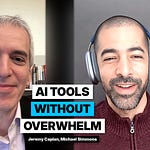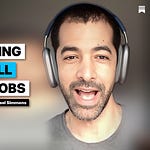Source: Tobi Lütke, founder and CEO of Shopify, at the 2024 Shopify Summit
Imagine watching Shopify CEO Tobi Lutke deliver what seemed like a masterful presentation at their annual summit. Just as thousands of employees were settling into their seats, he dropped a bombshell:
"I have a confession to make. That was not my summit talk. That was all AI generated until this point."
In that moment, Lutke didn't just give a presentation – he shattered our understanding of what's possible with AI. But here's the truly mind-bending part: The way he did it reveals a fundamental shift in how the most successful people will work in the future.
While most people are still copying and pasting prompts into ChatGPT, pioneers like Lütke are orchestrating entire teams of AI agents to accomplish what seemed impossible just months ago. He showed how anyone can create their own personal AI team, turning themselves into a one-person creative and operational powerhouse. Think of it as having a startup's worth of talent at your fingertips, 24/7.
Understanding these shifts now – before they become obvious to everyone else – could be the difference between:
Being the person who gets promoted because they can do the "impossible"
Being the founder who can execute their vision without a large team
Being the creative who can produce at 10x their current output
Being the professional who can reinvent themselves at will
Or being left behind wondering how others are accomplishing so much.
In this analysis, I'll break down the crucial, non-obvious implications from Lutke's revelation that will reshape how we work, create, and succeed:
The Rise of Personal AI Teams: Why Having Your Own "Terrarium" of AI Agents Will Be a Career Superpower
The Counterintuitive Truth About AI Prompting: Why Character Beats Commands
The OODA Loop Revolution: How AI Agents Are Transcending Simple Chat Interfaces
The Emergence Advantage: Why Hundreds of Decision Cycles Create Breakthrough Results
How AI Teams Will Fill Our Professional Gaps
The 3D Revelation: Why Physical Space Matters Even in AI Collaboration
How Virtual Learning Environments Will Transform Professional Development
Why "Impossible" is Becoming "Very Hard" (And Why That Changes Everything)
Free subscribers get access to the first two implications.
Paid subscribers get access to all eight in addition to $2,000+ in other bonuses.
Let's dive deep into each of these second- and third-order implications:
1. The Rise of Personal AI Teams: Why Having Your Own "Terrarium" of AI Agents Will Be a Career Superpower
Earlier this week, I shared a profound 70-second clip of Jensen Huang, the founder and CEO of Nvidia, one of the leading AI companies in the world. The clip gave us a glimpse into the future of AI-first, agent-powered knowledge work that you likely haven’t seen anywhere else:
Nvidia is now using AI at every level of their company
Huang’s vision for the future AI-human workplace is astonishing
Huang plans to have 2,000 AI assistants per employee
Nvidia makes $4M in revenue per employee
Whereas this clip provided a glimpse of the future, Lütke’s presentation gave us a full experience of it.
Lutke's demonstration reveals a profound shift in how we should think about AI augmentation. Instead of using single AI chatbots, the future belongs to those who can orchestrate teams of specialized AI agents. Think of it like moving from having a single talented assistant to managing an entire specialized department.
In Lütke's example, he created several agents with distinct personalities and roles:
Kate: The project manager who coordinates the team
Lexi: The archivist who analyzes previous talks
Dawn: The slide designer
Gordon: The structure specialist (who happened to love dancing!)
This approach mirrors how high-performing human teams work - with specialized roles, distinct personalities, and emergent group dynamics. Just as the most successful executives know how to build and manage human teams, future knowledge workers will need to master the art of creating and orchestrating AI agent teams.
Consider this metaphor: If current AI use is like having a Swiss Army knife (versatile but limited), having a terrarium of AI agents is like having an entire workshop of specialized tools, each optimized for specific tasks and working in concert.
Second-Order Effects: The Transformation of Professional Leverage
1. The Personal Scale Revolution
Traditional organizational leverage required:
Building human teams
Managing overhead
Coordinating schedules
Dealing with human resource constraints
The AI terrarium model enables:
Instant team scaling
Zero overhead expansion
24/7 operation
Unlimited specialization
2. The Emergence of Personal Operations Centers
Just as corporations have operations centers, individuals might maintain:
Personal AI coordination dashboards
Agent performance metrics
Team composition strategies
Cross-agent learning systems
3. The Evolution of Professional Identity
When everyone has access to AI teams, professional value shifts from:
Individual capability → Orchestra conducting skills
Personal knowledge → Knowledge navigation (meta-knowledge)
Task execution → Strategic direction
Direct output → Team optimization
Third-Order Effects: Organizational and Economic Implications
1. The Redistribution of Professional Power
When individuals can maintain AI teams:
Traditional organizational advantages diminish
Solo practitioners can compete with large firms
Geographic constraints become even less important
Entry barriers lower across industries
2. The Transformation of Organizations
Companies might evolve from:
Hierarchical structures → Networks of AI-empowered individuals
Fixed departments → Fluid AI-human collaborations
Centralized resources → Distributed capabilities
Standard processes → Personalized workflows
2. The Counterintuitive Truth About AI Prompting: Why Character Beats Commands
One of the most surprising revelations from Lütke's talk is that the secret to better AI performance isn't in technical prompting techniques, but in creating rich character backgrounds. As he explains:
"The more backstory you give them, the more properties, the more abilities you give them, the better they become."
This insight turns conventional wisdom about AI prompting on its head. Instead of focusing on mechanical instructions like "think step by step," the key is to create rich, detailed personas that can think and act autonomously.
Think of it like the difference between giving someone a detailed checklist versus helping them develop a deep understanding of their role and responsibilities. The latter approach leads to more nuanced, creative, and effective results.
Second-Order Effects: The Transformation of AI Development
1. The Evolution of AI Training
Current AI development focuses heavily on:
Fine-tuning with specific datasets
Optimizing for particular tasks
Improving technical capabilities
The character-based approach suggests a different path:
Developing coherent AI personalities
Creating rich contextual backgrounds
Building consistent behavioral frameworks
This is like the difference between teaching someone to follow a cookbook versus helping them think like a chef.
2. The Rise of AI Psychology
Just as human psychology helps us understand human behavior, we might need an entirely new field of AI psychology that focuses on:
How AI personalities develop
What types of backstories work best for different tasks
How to create stable, consistent AI identities
The impact of different personality traits on AI performance
3. The Emergence of AI Identity Design
This could spawn a new professional field focused on:
Crafting effective AI backstories
Designing consistent AI personalities
Creating appropriate behavioral frameworks
Developing AI character development methodologies
Key Takeaways: The key insight is that the future of AI interaction might be less about technical mastery and more about understanding and developing AI personalities. This suggests a fundamental shift from seeing AI as tools to seeing them as entities with distinct identities and psychological frameworks.
This transformation could remake many aspects of professional life, from how we develop AI to how we structure organizations and think about identity itself. The professionals who thrive will be those who can navigate this new landscape of AI psychology and identity development.










